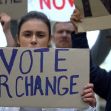Florida is one of 18 states in the U.S. with a system in place to directly involve the public in passing amendments to the state constitution. Over the years, this form of “direct democracy” has helped introduce meaningful legislation with powerful participation from the people themselves, rather than depending solely on legislators to incite change.
Florida has six ballot measures slated for the 2020 General Election. Two are specific to property taxes; the other four are citizen initiatives, which have a history of effecting significant collective change in the Sunshine State. This year, a new Amendment 4 stands out: Floridians will decide if citizen initiative constitutional amendments will continue to pass with 60 percent of the popular vote—or if every initiative will be put on hold until it secures at least that majority in two successive elections.
A citizen initiative in Florida needs to gather a hefty signature tally across the districts just to qualify for the general election. If a measure manages to gain eight percent of district votes in at least 14 congressional districts (out of the states total 27 districts), it can be submitted and certified to join a statewide ballot. In 2020, the total signatures had to exceed 766,200.
This year’s new Amendment 4 secured the required marks and, thus, its place in the voting booth. In theory, the measure aims to suppress the supposedly overactive influence of citizen initiatives on the state’s constitution.
It wouldn’t be the first time the state sought measures to protect its constitution’s integrity: in 2006, Florida passed an amendment to raise the majority vote requirement on initiatives to 60 percent, instead of the previous regulations, which needed only a simple majority.
Some states with similar direct democracy procedures have implemented more obstacles over the years, and some have nearly unsurmountable requirements. Florida’s implementation of a 60 percent “supermajority” put them somewhere in the middle as far as their requirements’ severity.
The “Require Constitutional Amendments to be Passed Twice Initiative” has the potential to hinder future propositions of grassroots organizers drastically.
The solitary campaign sponsoring and boosting this particular initiative since its creation, “Keep Our Constitution Clean PC,” says their mission is to educate voters and protect professional canvassers. The double pass, they say, will diminish a deluge of “whimsical” constitutional amendments. It contrasts the state’s several constitutional updates to the scarcity of amendments made to the U.S. Constitution since its creation.
Keep Our Constitution Clean has declined to divulge the sources behind their over-nine million dollars of funding.
In reality, the group is rather mysterious beyond their lavish support for Amendment 4, causing critics to eye the organization as “dark money.” They are thought to be gleaning their funds from corporate behemoths like U.S. Sugar Corp., Florida Power & Light, and even Walt Disney World, as reported by the Orlando Sentinel. They even have financial links leading back to GOP politicians and attorneys.
Despite the campaign’s worries, citizen initiatives don’t exactly represent an unrestrained force against democracy. Florida’s constitutional amendment laws are relatively rigorous, and they are widely considered to be both a measured and positive practice in direct democracy. As such, the “Require Constitutional Amendments to be Passed Twice Initiative” has drastic potential to hinder future propositions, especially from grassroots organizers.
The 60 percent majority requirement is already the highest in the country, and the addition of this new hurdle would make direct democracy in Florida all but obsolete. Sustaining campaigns behind citizen initiatives would fall out of reach for most and become attainable only to wealthy corporations that can pour millions into their proposals. In comparison, the grassroots organizers behind some of the state’s most meaningful civic action would be hard-pressed to fund such drawn-out operations, but the rich would have another chance to sell their position instead—literally.
Additionally, amendments don’t pass into law without additional regulations controlled by legislators. For example, Floridians previously voted on a 2018 ballot initiative also known as Amendment 4. It was meant to dismantle felon disenfranchisement, broadening voting rights in the state. The referendum secured well over the requisite supermajority. However, state officials, including the governor, were quick to enact their own legislation to severely limit the scope of that initiative. Essentially, ballot initiatives can be utilized to apply tangible, citizen-led change, but the Florida constitution is not in danger of the public exercising unbridled access to legislation practices.
If this new Amendment 4 passes, citizens will need to somehow finance their attempts for another two years leading up to the next general election. The ACLU of Florida and the League of Women Voters have both voiced opposition to the initiative, but, ultimately, it will be up to the people to decide for themselves on November 3. Ironically, the vote on Florida’s Amendment 4 could undermine that very power in future elections.






